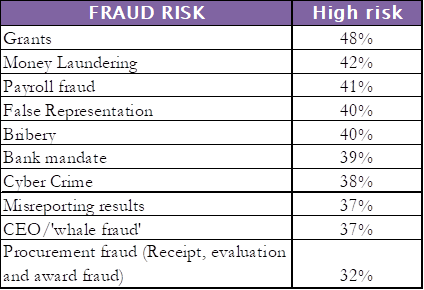Misspending government funding is the top risk area for fraud today, reveals new research by CIPFA, the Chartered Institute of Public Finance and Accountancy, and Moore Stephens, the top ten accountancy firm.
Almost half (48%) of accountants surveyed said that grant fraud poses a high or very high risk, putting it at number one on the CIPFA/Moore Stephens Global Fraud Risk Register.
Grant fraud is where individuals, businesses or charities apply for and receive money they are either not eligible for, or when eligible funds are then spent on activities that were not included in the conditions of the grant.
These grants can include EU or UN funding for activities such as research or humanitarian projects.
One recent example of grant fraud is the case of a Cambridge historian, who claimed £223,000 from the Heritage Lottery Fund for a fictional archaeological scheme, but instead spent it on mortgage repayments and a new car, and was subsequently jailed for six years.
Money laundering is seen as the second highest risk, with 42% of respondents rating it as a high or very high risk, followed by payroll fraud third, with 41% giving it the highest risk ratings. These fraud areas have been ranked as higher risk than ‘hot topics’ such as cyber-crime and bribery.
The research included a survey of over 150 partners across 37 countries to gauge the most serious at-risk areas across the globe. Respondents considered 18 different types of fraud, scoring them from 1 (lowest risk) to 5 (highest risk).
In developed countries, grant fraud comes top of the list of concerns with 53% of respondents rating it as high or very high risk, followed by bribery (47% of respondents) and payroll fraud (46%).
For the UK specifically, grant fraud and payroll fraud are the top two risks, with 44% and 41% of respondents rating it as high or very high risk respectively.
John Baker, Director at Moore Stephens, commented: “Government grants are often seen as an easy fraud target.
“It may seem surprising to find Government grants eclipsing more ‘fashionable’ areas like cyber-crime when it comes to fraud risk. That said, it may be the case that areas such as cyber and bribery have been addressed more recently due to the high profiles, leaving more traditional areas unattended.
“Respondents in both developed and emerging economies seem to agree that funding bodies and donors should be focusing on doing more to tighten up their scrutiny of grant applications.
“If it wasn’t for whistle-blowers and financial auditors, many of these fraudulent schemes would go unnoticed and millions would be lost to fraud.”
Peter Wilson, Director of Counter Fraud at CIPFA, said: "The Global Fraud Risk Register is an important indicator of where public sector fraud teams should be focusing their efforts. Fraud is always evolving and, with the rise in the number of high profile cyber fraud cases, is getting more sophisticated, but it is important we do not overlook the more traditional types of fraud, such as grant fraud, which can sometimes be the most prevalent".
In emerging markets, 62% of respondents rated grant fraud at high risk. This is the same percentage of respondents who rated CEO/whale fraud (where fake emails purport to be from company bosses instructing payments to be made to fraudsters) as high risk.
Percentage of respondents scoring fraud risks high or very high

ENDS
About CIPFA
CIPFA, the Chartered Institute of Public Finance and Accountancy, is the professional body for people in public finance. CIPFA shows the way in public finance globally, standing up for sound public financial management and good governance around the world as the leading commentator on managing and accounting for public money.
The CIPFA Counter Fraud Centre leads and coordinates the fight against fraud and corruption across local and central government, the health, education and charity sectors. It supports public sector bodies to:
- prevent, detect and recover financial loss
- protect their reputation
- develop counter fraud skills.
About Moore Stephens
Moore Stephens is the UK’s 9th largest independent accounting and consulting network, comprising over 2,000 partners and staff in 37 locations. Moore Stephens LLP is an independent member firm of Moore Stephens International Limited, one of the world's major accounting and consulting networks with 626 offices in 108 countries.
Moore Stephens offers a flexible online tool for managing fraud risks and their mitigating controls and improvement actions, called Rhiza. Rhiza is an easy-to-use and straightforward system which can also be scaled up to manage enterprise risks – helping to fully embed fraud risks into corporate Risk Registers.